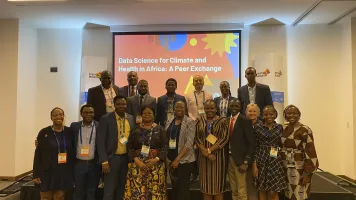As young people took the stage in New York for the Summit of the Future, their presence acknowledged their role in paving the way for agenda 2030 and beyond. The event, which focused on tackling global challenges such as crises and war, climate change, social inequality, and the need for equitable development, prominently featured youth perspectives—reflecting the growing recognition that young people hold the key to tomorrow's solutions.
This is particularly true for challenges related to equity, justice, and fairness in data and digital processes.
Young people live and breathe the digital world. In fact, those aged 30 and under are the most digitally connected worldwide. From social media to online influencing, activism to entrepreneurship, youth are shaping the digital future. Their immense data and digital footprints reflect their online activities and potential to influence societal trends, policies, market shifts, and technological advancements.
Yet, despite generating an enormous amount of data, youth perspectives are rarely incorporated into decisions about how their data is handled and used. From privacy concerns to data ethics, the voices of young people are missing in discussions that directly impact their lives. This exclusion undermines the fairness and equity of data governance, leaving critical gaps in ensuring that data practices serve the needs of everyone most involved. This disconnect is alarming—and it's something that must change.
The missed opportunities
To ensure equitable and inclusive data governance, we must reconsider who shapes these processes. Youth participation is not just important; it's crucial. Young people’s experiences, skills, and agency reflect the evolving data and digital ecosystem. They also bring unique perspectives that are fresh, creative, and innovative for approaches to data management, making their presence at the decision-making table essential.
Additionally, equitable data governance means the realities of youth and their communities are represented in the policies and frameworks guiding data use. Without their input, we risk creating systems that ignore or misrepresent their challenges, from access to education and employment to navigating social inequalities.
Furthermore, as their participation in the global digital economy grows, youth must be involved in data processes—not passive subjects but active contributors. Beyond ensuring that data governance is fair and inclusive, youth engagement is also a matter of preparing them for the future. With youth unemployment remaining a significant concern worldwide, creating pathways for young people to contribute to data production, analysis, and use can open doors to meaningful employment and leadership opportunities.
The role of the Data Values Advocate program
The good news is that change is already happening. Through initiatives like the Data Values Advocates Program, the Global Partnership supports and amplifies youth voices and agency and gives them the tools they need to shape the future of data governance.
The Data Values Advocates Program focuses on equipping young people with policy and advocacy skills, enabling them to influence data decisions in their communities. By building capacities in data literacy and governance, the program empowers youth to become change agents, driving more inclusive and equitable data policies that reflect the priorities of their communities.
Through the program, our first cohort of advocates highlighted the transformative potential of youth-led action. From facilitating workshops with community leaders and policymakers to conducting training sessions with women with disabilities, empowering them to advocate for their data rights, and engaging young people on AI and data privacy, the breadth of their work was astonishing. The work of the young people in the program created a tangible impact. They served as catalysts, supporting others—particularly those from marginalized communities—to engage and advocate for more equitable data practices.
This program highlights the importance of investing in youth—not just for their own professional growth but for the long-term development of data systems that are fair, transparent, and beneficial to all.
The path forward: Embedding youth in the future of data
As the excitement of the Summit of the Future fades, the challenge is ensuring that youth engagement isn't limited to high-profile events. Young people must be embedded in decision-making processes, not just spotlighted for their energy and ideas. They need ongoing opportunities to lead in data governance, policymaking, and innovation.
This means we must create more pathways for young people to transition from advocates to decision-makers. It means recognizing that youth engagement is not a checkbox to be ticked but a long-term commitment to equitable and sustainable governance. The global digital space is evolving rapidly, and if we fail to include youth in shaping its future, we will miss out on their invaluable contributions.
The future of data governance must be one where young people are not just present—they must lead. Through their leadership, we can create data systems that are truly equitable, inclusive, and reflective of our diverse and ever-changing world.
Photo: Shannon Lisa (left), Global Focal Point of the Major Group for Children and Youth: Chemicals and Waste Youth Platform, and Nahjae Nunes (right), UNICEF Youth Foresight Fellow and Commonwealth Youth Council Policy and Advocacy Chair, speak during the Summit of the Future Action Day One session titled '#YouthLead: Strategic foresight in climate and sustainability'. Credit: UN Photo/Laura Jarriel.

